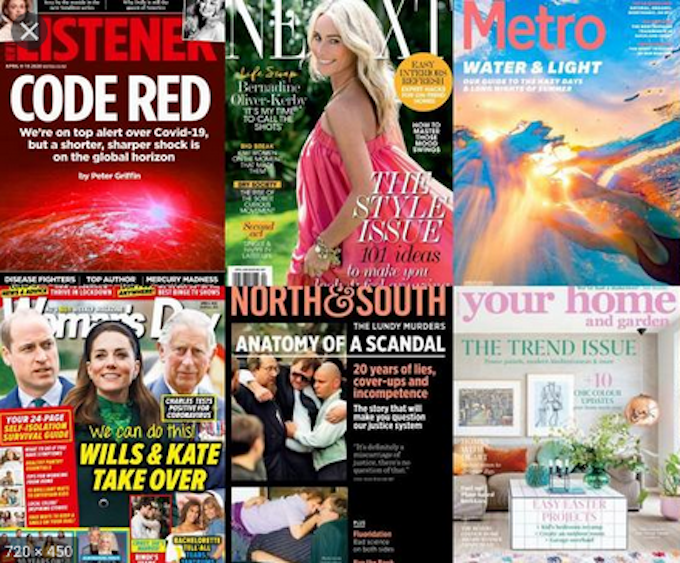
By Sri Krishnamurthi, contributing editor of Pacific Media Watch
Media on both sides of the Tasman face apocalyptic times as the Covid-19 coronavirus pandemic decimates the industry with Bauer Media NZ closing its doors and host of regional – 23 at the moment – Australian papers being shut down.
Add to that, the imminent closure of the Australian Associated Press on June 26 – although that had nothing to do with the virus – and there is not much to be optimistic about in the industry.
READ MORE: Bauer Media closures – so many livelihoods, so much destruction
“NZ journalism must not be left to languish. The sudden closure of Bauer Media NZ is devastating for New Zealand journalism and for the publics which depend on it in this time of national crisis,” said Dr Greg Treadwell, president of the Journalism Education Association New Zealand (JEANZ) in a statement issued yesterday, which was co-signed by Dr Tara Ross, head of journalism at the University of Canterbury and Charles Riddle, principal academic staff member, journalism, at Wintec.
“Iconic magazine titles that have been household names, some for generations, were today shut down, with the Covid-19 crisis blamed for the closures.
“Among the pages consigned to history today was the work of some of the country’s pre-eminent journalists. The implications for New Zealand democracy are serious.”
He described it as numerous blows to the media industry.
Essential industry reeling
“These closures have impacted an essential industry already reeling with multiple structural and commercial failures.
“Redundancies are under way or reportedly mooted for other major media companies in New Zealand.
“The Journalism Education Association of New Zealand urges the New Zealand government to keep public-affairs journalism at the forefront of its thinking as it moves to support New Zealanders during the Covid-19 crisis,” Dr Treadwell said.
Meanwhile, in Australia the Journalism, Education and Research Association (JERAA) has joined the Media, Entertainment and Arts Alliance (MEAA) in calling on the government to provide $40 million emergency funding from the Regional and Small Publishers Jobs and Innovation Package as a survival fund to keep regional and rural newspapers alive during the coronavirus crisis.
“I think that is a really important thing in Australia right now, New Zealand suffers from this as well,” Dr Treadwell said.
“But I completely understand our Australian colleagues calling on the government to support their community newspapers because they suffer from news deserts there, not just physical ones, but news deserts where whole communities have no local papers.
“This is happening in New Zealand as well, our community newspapers that are around here need to operate during the lockdown.
‘Dreadful state’
“I do think the New Zealand community newspaper scene is in a dreadful state.”
As, for Australia, in a statement JERAA said Saffron Howden’s evolving map of Australia showed 23 closed newspapers including the Sunraysia Daily, The Guardian – Swan Hill, Gannawarra Times, Loddon Times, Barrier Daily Truth, Yarram Standard, Great Southern Star, Latrobe Valley Express, Star News Group, Maryborough District Advertiser, Gulf Chronicle, North Central News, Shepparton News, New South Western Standard, Cape and Torres News, The Bunyip, Bairnsdale Advertiser, Warragul and Drouin Gazette.
In addition, JERAA also noted News Corp Australia’s decision to suspend the printing of 60 community titles in New South Wales, Victoria, Queensland and South Australia from April 9.
While these publications will continue to publish digital news, the loss of print products will be an accessibility issue in regions with aging populations or limited internet access, the JERAA statement said.
Dr Treadwell called on the government to support New Zealand’s community newspapers.
He expressed sympathy for the Kaiatia-based Northland Age and its editor Peter Jackson, which has closed after 116-years.
“The idea of the Northland Age no longer publishing is heart-breaking, the government needs to act, it’s not as if you can off a newspaper and turn it back on again,” he said.
In the JEANZ statement, he said: “While we commend the change that will allow community papers to publish during the national lockdown, the government should also make plans to ensure all New Zealanders continue to get high-quality information in the coming months.
“Not only will we need strong science and environment reporting, we will need in-depth, long-form and even creative journalism to tell the complex stories that will arise from this pandemic.
“A well-informed public will be essential. An adequately resourced news media, across both public and private sectors, is also critical in the current state of emergency, given the dramatically increased powers the state has at its disposal.”
Pacific facing crisis too
Pacific Media Centre director Professor David Robie, who is also deeply concerned about the impending crisis for many Pacific Islands media groups, said his response to the closures in Australia and New Zealand was “in a word – devastated”.
“The media in many respects has been dying a slow death, certainly in print. And although we have a number of small yet successful start-up digital media ventures, we have witnessed the gradual decline of quality media overall in New Zealand,” he said.
“In one foul swoop, a foreign-owned corporate, Bauer Media, has been allowed to destroy the heart of New Zealand’s magazine industry. And there has been barely a whimper.
“We no longer even have a strong media union – such as Australia has with the MEAA to stage at least some semblance of a defence. I find it quite outrageous that a German company can do this, one that has just reported group profits back home – just dump a cluster of NZ cultural icons in publishing with such titles as Metro, the Listener and NZ Woman’s Weekly with their long and proud histories.
“Especially when we are led to believe that the government tried to intervene and offered substantial financial support to keep the company going. One suspects that Bauer were planning to scuttle the magazines anyway and the pandemic simply provided the pretext.”
Dr Robie said he believed all media in New Zealand should have been treated as “essential services” – especially in this “so-called post-truth era when we are faced with an avalanche on lies, disinformation and fake news”.
“Many among the general public don’t know what to believe any more. We need more quality media with a trusted pedigree, not less.
“And community publications identified closely with their neighbourhoods and ethnic and diasporic media are also vitally important in our democracy. Closing or silencing of media inevitably weakens the robustness of our democracy.”
Apart from Bauer Media, the Northland Age and Radio Sport, Mediaworks has asked staff to take a 15 percent pay cut, Television New Zealand has frozen payrates, NZME is calling redundancies and Stuff staff have been warned to expect a cull.
















































